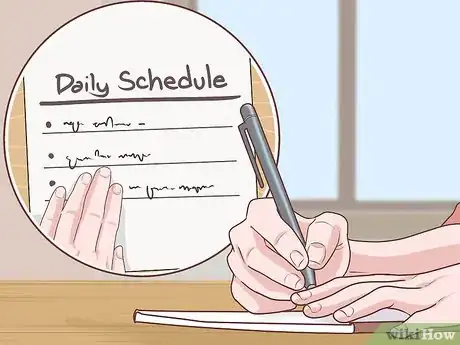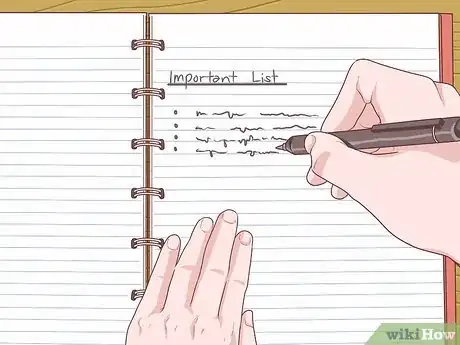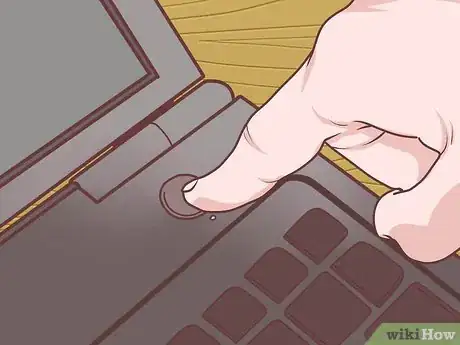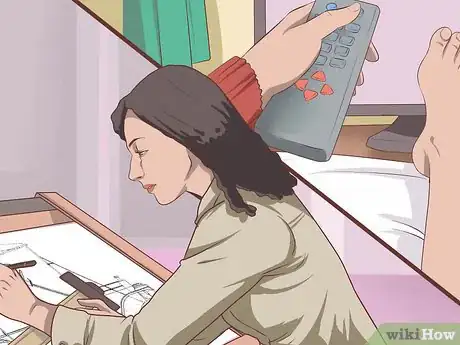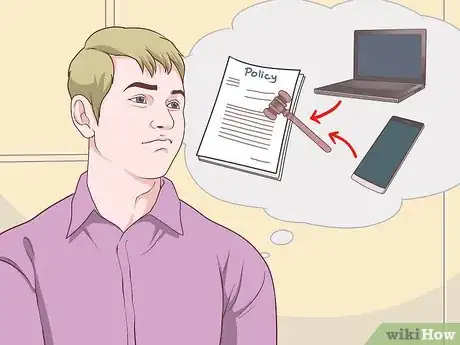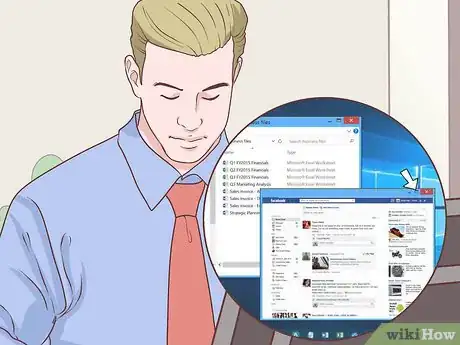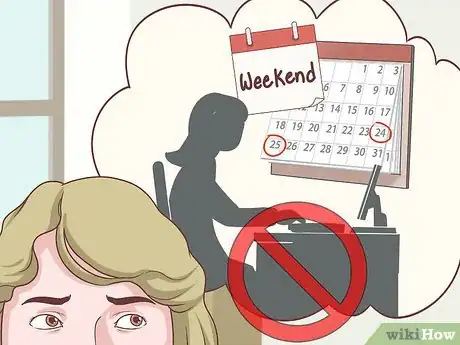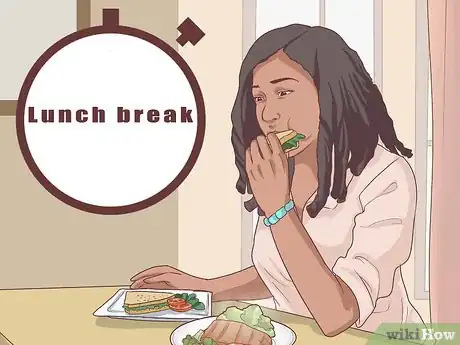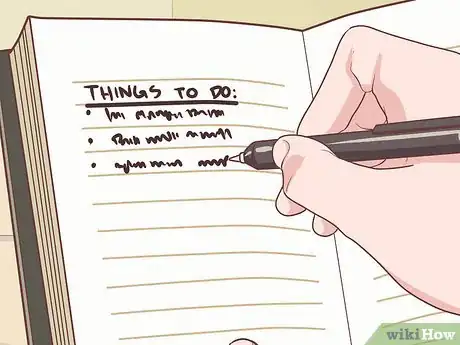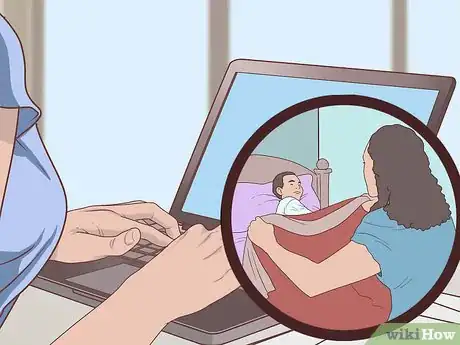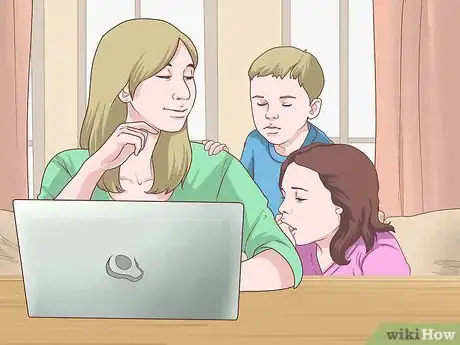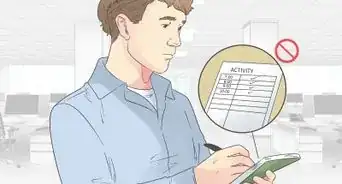This article was co-authored by Trudi Griffin, LPC, MS. Trudi Griffin is a Licensed Professional Counselor in Wisconsin specializing in Addictions and Mental Health. She provides therapy to people who struggle with addictions, mental health, and trauma in community health settings and private practice. She received her MS in Clinical Mental Health Counseling from Marquette University in 2011.
There are 15 references cited in this article, which can be found at the bottom of the page.
wikiHow marks an article as reader-approved once it receives enough positive feedback. In this case, 96% of readers who voted found the article helpful, earning it our reader-approved status.
This article has been viewed 224,221 times.
Maintaining your career/academic and personal life can get pretty hectic sometimes. Most adults can probably admit to having their school or work life intrude on their relationships or families and vice versa. Being able to strike a balance between your professional and personal lives can help you become more productive and less likely to burnout. This balancing act takes careful planning and preparation, but it is possible.
Things You Should Know
- Create a daily work and personal schedule to stay on track of both your to-do lists.
- Make time for hobbies and activities you enjoy outside of work.
- Say “no” and try cutting back on your workload so you can stay present and avoid unnecessary stress.
Steps
Managing Your Time
-
1Try to separate work and play. In the age of online learning and telecommuting, you can easily spend your whole day at home and get everything done. Attending school or working from afar may even add more flexibility to your home life. However, a downside is that work or school can creep over into home and/or family activities. It can be hard to back away when work is always within reach. Plus, without a clear separation between your home and office, it may be hard to transition from your work life to your personal life. To counteract this issue, you need a distinctive work zone.
- If you telecommute or go to school online, you might find it helpful to get work done at a local library, coffee shop, or cohab community for students or telecommuters. When your work is done, you can physically leave the environment, which might help you to transition to your personal life.
- If you have to work inside of your home, then do your best to keep a separate space for working. This might be a home office, or just a specific spot at your kitchen table. Don’t stress if you occasionally work someplace else.
- If you work in a traditional office, make sure that you find a relaxing way to transition from work to personal life when you finish up for the day. For example, you might use your commute home to listen to music or a book on tape, or stop by the gym for a quick workout, or call up a friend and chat for a bit.
-
2Set priorities. To successfully walk the tightrope between professional and personal you need to understand where your priorities lie. Therefore, in a pinch or when faced with an urgent circumstance, you aren't conflicted about what's most important to you.
- Create a list of the most significant aspects of your life. Of course, you might include items like family, romantic relationships, work, and spirituality. You might also include volunteering, staying active, maintaining a social circle or other passions.
- Review your list and rank these items starting with #1 as the most important, #2 as the second most important and so on. Your rankings will show where your priorities lie. That way you can be sure to make an effort to incorporate these top priorities into your daily and weekly schedules.[1]
Advertisement -
3Create a schedule and try to stick to it. If your week goes by in a blur and you are unable to recount which tasks you do on which days, it can be helpful to spend a week logging everything you do. After this week has passed, you will have a better idea of how to factor in different work/school assignments and personal activities or errands into your schedule.
- It can be most helpful to develop a weekly schedule involving all the constants like work, classes, church, and social activities with other one-time events. Then, each night before map out a daily to-do list of the individual tasks you need to get done based on your priorities.[2]
- For your daily schedule, highlight the three most important tasks you need to get done each day (aside from actually going to work or going to school).[3] These might be professional items like working on a presentation or personal items like going to the dentist or your daughter's ballet recital.
- You may even create two separate lists if this one is to constricting - one with three major tasks for work/school and one with three major tasks for home. As long as you have accomplished these 3 to 6 tasks each day, you will have been productive.
-
4Manage procrastination. Procrastination is a major obstacle that could be standing in your way of striking a good balance. You may see your professional and personal lives seeping into one another because you often wait until the very last minute to get things done. This causes you to end up working late, or being distracted at work by personal tasks.
- One method to overcome procrastination is to write out your reasons for enrolling in school or being in a particular career path and so on. For example, if you want to help people, you can complete your assignments with the intrinsic purpose that they are helping you reach that goal. Keep this list in your work space for when you are feeling unmotivated.
- Another way to beat procrastination for getting things done is to break larger projects down. Doing so makes the overall project seem less daunting and increases motivation as you complete the smaller parts.
-
5Eliminate distractions. You'd be surprised how much distractions are impeding on your time and productivity. Research estimates claim most people spend about 20 minutes of every hour handling unplanned distractions. As a result, about two whole hours of each day is spent trying to refocus after being distracted.[4] If you can minimize the distractions in your professional life, you can prevent it from constantly interfering with your personal life. Try these tips to eliminate distractions:
- Focus on important rather than urgent tasks - urgent tasks are reactive-based, important tasks are proactive-based
- Turn off the notifications on your phone or computer
- Create a clean and clutter-free work space
- Put your phone away
- Close any programs you're not actively using
- Get water, snacks or visit the bathroom during routine breaks to minimize physical interruptions
-
6Be inventive. Regardless of how hard you try, there will be some times when one or the other becomes more demanding in your life. Learn to be creative and think up possible ways you can meet the urgent priority while still attending to the other.
- For example, maybe you are working overtime every week and never get to go out with your significant other. You can make the special effort of lighting candles during dinner or choosing a film to watch on the couch one evening. This won't take up too much of your time and it may prevent your partner from feeling neglected.
- You may be able to pass off large projects or split the time with another coworker to ease your workload and make more time for relationships and family. If you can't afford to work less, plan to spend your lunch hour in the park with your family or bring your family to the work picnic.
Creating Boundaries
-
1Assess your situation. As hard as you try to strike a balance, there may be some situations where crossover is necessary, especially if you have kids. Consider your personal and professional lives to identify situations where some crossover may be necessary. Think about your family members and your personal responsibilities. How often do these people and responsibilities require your attention while you are working?
- For example, if you have young children, then arranging your work schedule around your kids’ schedules may be necessary. Or, if you are the primary caretaker of your children and you work from home, then you may need to put work aside and take a break whenever one of your kids needs something.
- It is also possible that work may have to take precedent over your personal life sometimes. For example, if you work as an on-call healthcare provider, then you may sometimes need to cancel something in your personal life to do your job.
-
2Be protective of your health. The needs of others at work, school, or home can quickly overwhelm our own physical needs. Unfortunately, neglecting your health can have costly consequences, such as missing work or classes and being unable to participate in social or family events. Being anxious about getting everything done creates stress, and if it is not tended to stress can have debilitating effects on your physical and mental health.[5]
- To counteract stress and nurture your body be sure to get involved in some type of physical activity several times per week. It can be joining a company sports team, jogging around the block with your partner, or visiting a local gym.
- In addition to exercise, you can combat stress by consuming several balanced meals each day, getting adequate sleep, and pursuing your outside interests.[6]
-
3Shield your passions. When work, school, or relationships become too demanding, we might give up our hobbies or interests to meet those demands. The problem is, giving up these things take away our ability to debrief from professional and personal stress. Make an effort to protect your leisure time and continue any social outlets or hobbies you participate in.[7]
- Try treating yourself with a short break to engage in a hobby after completing a significant amount of work.
- Another way to shield your passions is to schedule them in. Work your pottery class or book club into your calendar just as you would with professional projects or family obligations.
-
4Learn to say "no". It may seem rude or selfish at first, but, with practice, you may find that selectively turning down different projects or opportunities is quite freeing. Say "yes" to those requests that meet your top priorities and that do not constrain your already packed schedule. Here's how to say "no":[8]
- Show that you understand the significance of the request by saying something like "It sounds like a great opportunity, but..."
- Give a brief explanation, such as "Honestly, this is a bit outside my area of expertise" or "I have too many deadlines approaching."
- Recommend an alternative. For example, you might say "I can't, but I think I know someone who would be a great fit".
-
5Cut back. If work and home are constantly competing for your time, then you need to make the choice to cut back on one or the other. Otherwise, you will keep yourself stressed and unhappy. Take a look at your life to determine which side needs greater boundaries.
- Do you regularly get called away from home for work? Does your boss drop assignments on your desk at the last minute? Are you financially able to work a bit less? If the answers to most of these are "yes", work may have been intruding on your life, but it looks like you can afford to talk to your boss about cutting down your hours or workload.
- If you are a working mother, cutting down on your work hours may be the key to feeling more content. Research shows that women are generally happier when they cut back on work for the sake of meeting family needs.[9]
- Does your partner or spouse frequently interrupt your work day for non-emergency family or home issues? Is your work performance suffering because you stay up all night partying with friends or your partner? Do you have to leave work to handle errands or do excessive amounts of housework? If you said "yes" to any of these, your home life may be stifling your capabilities at work. You need to decide if you need to set boundaries with individuals in your home that often intrude on your career.
Handling Social Media
-
1Have separate professional and personal profiles. With social media becoming an ingrained part of most people's work and home lives, it can be hard to separate the two. If you are active online in both your professional and personal lives, it's important to create a distinction between them to monitor what is being put out in the online world regarding that side of you.
- Many people choose to use LinkedIn for their career or academic connections and Facebook or Instagram for friends and family.[10]
-
2Be clear about how to handle professional and personal data.[11] If you telecommute, you need to be aware of your company's policy for dividing professional and personal data. Some companies may provide their employees with completely separate devices (e.g. phones and computers) strictly for work purposes. Others may allow the use of personal devices.
- Find out what the guidelines are about such matters. Also, be sure that any personal data, such as contacts, photos, and music are appropriately backed up.
-
3Create specific windows for being active online.[12] If social media is a part of your professional life, you may find yourself spending excess time online beyond what's necessary for your job. Logging on several times a day or whenever a notification pops up is disruptive to both your professional and personal life.
- Make the choice to unplug for a few hours each day. Or, choose a short window to engage with your friends or followers online, then log off for the remainder of the day.
Working from Home
-
1Try to keep set work hours. It can be hard to maintain the same work hours every day when you work from home, but maintaining regular work hours can help you to keep your work and home life separate.[13] [14] Choose realistic work hours and stick to them. For example, you might decide to work from 8:00am to 4:30pm on Monday through Friday.
- Don’t let your work hours creep into your personal time. When it is time to stop for the day, stop working, shut down your laptop, and step away from your work space.
- Try to set work hours that work with your personal life. For example, try to avoid working on the weekends if you know that there are things you will want to do.
-
2Dress for work even when you are at home. Change into work clothes in the morning and non-work clothes in the evening. Rolling out of bed and going straight to your workspace in your pajamas will make it harder for you to transition into your workday. The same thing goes for wearing your work clothes into the evening.[15]
- Try getting up about 30 to 60 minutes before you want to start working for the day so that you can get dressed for work.
- Make sure that you change out of your work clothes when it is time to relax. For example, you can switch to pajamas or your favorite jeans and a t-shirt.
-
3Take a lunch break. When you work at an office, taking a lunch break is necessary and you may even have someone else reminding you to take one. However, when you work from home, it can be hard to remember to take lunch breaks and you may be tempted to work through your lunch or eat at your workspace. Instead, make lunch breaks a mandatory part of your day.[16]
- Set a time for your lunch break to start and end every day. For example, you might agree to take lunch from 12:00 to 12:30 each day.
- Ask a family member or significant other to remind you when it is time for your lunch break. If you are worried about forgetting to take a lunch break, then ask one of your friends or family members to come get you when it is time for a break.
-
4Prevent yourself from doing household tasks. You may be tempted to do things around your house while you are taking a quick break or making a work phone call, but this can blur the dividing line between work and home.[17] [18]
- Try to prevent yourself from doing any housework or anything that is not work related while you are on the clock. If you notice a household chore that you want to complete, write it down on a notepad and save it for the end of your work day.
- Keep in mind that everyone is different. For example, if you find that folding laundry is a soothing way for you to spend a break, then go for it!
-
5Treat yourself at the end of the day. Finding a simple way to reward yourself for a hard day of work is also important. You can reward yourself with a walk outside, a cup of tea, a chat with a friend, or any other pleasant activity that indicates your work day is over.[19]
- Consider doing something social at the end of each day. Working from home can be isolating, so it is important for you to find ways to interact with other people. You can do this by talking to your significant other, meeting up with some friends for coffee, or taking an aerobics class after work.
Balancing Childcare with Work
-
1Consider keeping a more flexible schedule. Working set hours does not work for everyone, especially for those who have young children. You may have to get used to getting your work done 5 to 10 minutes at a time to accommodate your kids’ needs or you might have work in the evenings to complete what you didn’t get done during the day.
- You may also need to keep some odd hours to balance your personal and professional life as a parent working from home. For example, if you have young kids at home with you when you are working, then you may need to work an hour or two after your kids go to sleep or after your partner returns home in the evening.[20]
- Make sure you ask your employer or client if it’s okay if you work on a more flexible schedule to accommodate your child’s needs. Flexibility might not be an option if your employer expects you on the clock between certain hours every day. However, if you’re a contractor, you might be allowed to work when you can throughout the day or night.
-
2Take advantage of childcare options. Asking someone to watch your kids for a few hours each day can also be a great way to get things done. If you have willing grandparents or other family members close by who are willing to watch your children for a few hours every day, then you may want to take advantage of that.
- Consider what works best for you and your babysitter. For example, maybe your parents can come over to the house, or you can drop your kids off for a playdate with grandma a few times a week.
- A trustworthy babysitter can also be a great option if you can afford to pay someone to watch your kids. If you do not have a good regular babysitter, then ask friends and family if they know anyone.
-
3Use busy boxes to entertain your kids while you work. If you don’t have anyone to watch your kids while you work during the day, then you will often need to find other ways to keep them busy with something while you work.[21] One way to do this is to create a busy box with lots of fun items in it to keep your child busy while you work.
- A busy box is filled with a variety of toys and activities that are meant to keep your child entertained while you work. For example, a busy box might include, crayons, clay, a coloring book, stickers, puzzles, and other toys for your child.
- Prepare busy boxes the night before and place them near your work space. You can use an empty shoe box or other small box and select from your child’s toys and other items to create the box. You might even throw in a surprise now and then, such as a new coloring book or a new package of stickers.
- You can even create themes for busy boxes. For example, if you want to teach your child about colors, you can make boxes with collections of red items, blue items, etc. Or, you might create a theme for a busy box based on one of your child’s favorite movies, books, shows, or characters.
-
4Work in the same room with your kids. It is a good idea to work in the same room with your kids so that you can supervise them and provide them with more entertainment options as needed. For example, if you work out of your home office, you might create an area for your kids by placing a special rug or play mat along with some of your child’s favorite toys.
- You might also need to learn how to talk to your kids and play with them while you work. Being able to work and engage with your kids at the same time is a skill, but you can develop this skill with practice.
- If you have a backyard with a play area for your kids or a nearby park with a playground, then you might even consider taking your work outside for an afternoon.[22]
References
- ↑ http://www.success.com/article/setting-priorities
- ↑ http://zenhabits.net/optimize-your-productivity-with-daily-weekly-routines/
- ↑ http://www.lifehack.org/articles/featured/back-to-basics-setting-priorities.html
- ↑ https://blog.asana.com/2015/07/workstyle-eliminatingdistractions/
- ↑ http://www.mentalhealthamerica.net/work-life-balance
- ↑ https://www.mentalhealth.org.uk/a-to-z/w/work-life-balance
- ↑ http://www.webmd.com/women/features/balance-life
- ↑ https://blog.asana.com/2015/07/workstyle-eliminatingdistractions/
- ↑ http://www.theatlantic.com/business/archive/2013/12/moms-who-cut-back-at-work-are-happier/282460/
- ↑ http://www.entrepreneur.com/article/231544
- ↑ http://www.entrepreneur.com/article/231544
- ↑ http://money.usnews.com/money/blogs/outside-voices-careers/2013/05/07/why-you-should-unplug
- ↑ http://www.apartmenttherapy.com/things-that-people-who-work-from-home-can-do-to-signal-the-end-of-the-day-217678
- ↑ http://www.workflexibility.org/separate-work-life-when-you-work-at-home/
- ↑ http://www.apartmenttherapy.com/things-that-people-who-work-from-home-can-do-to-signal-the-end-of-the-day-217678
- ↑ http://www.apartmenttherapy.com/things-that-people-who-work-from-home-can-do-to-signal-the-end-of-the-day-217678
- ↑ http://www.apartmenttherapy.com/things-that-people-who-work-from-home-can-do-to-signal-the-end-of-the-day-217678
- ↑ http://www.workflexibility.org/separate-work-life-when-you-work-at-home/
- ↑ http://www.apartmenttherapy.com/things-that-people-who-work-from-home-can-do-to-signal-the-end-of-the-day-217678
- ↑ http://money.usnews.com/money/personal-finance/articles/2013/06/12/how-to-effectively-work-from-home-with-kids?page=2
- ↑ https://www.apartmenttherapy.com/working-from-home-with-kids-making-it-work-184328
- ↑ http://money.usnews.com/money/personal-finance/articles/2013/06/12/how-to-effectively-work-from-home-with-kids
About This Article
To separate your personal and professional life, try to work or study in a specific place, such as a library or home office, so you can leave your work behind when you're finished for the day. Additionally, avoid sacrificing your hobbies by including your regular club meeting or other activity in your weekly schedule just as you would with a professional task. You'll also want to learn to say no in a positive way so you can turn down work when you have other plans, such as by saying "That sounds like a great idea, but…" For tips on how to manage your personal and professional presence on social media, keep reading!


